I'm Ica! welcome to my milgram sideblog!I draw, write, and ramble on about this fun (questionable) little series.main blog: @rose-and-releaseproship and terfs dni.
Don't wanna be here? Send us removal request.
Text

i miss her
#posting this before i crawl back into my cave for another 6 months#believe me i spedran this as soon as i remembered it was her birthday at like 6pm in my timezone so its a little messy#milgram#milgram project#milgram art#kotoko yuzuriha#milgram kotoko#yuzuriha kotoko
21 notes
·
View notes
Text
Mahiru Shiina - Super Heartbeat
#edit repost from tiktok for archival purposes hiiiii#I'm sorry mahiru I'm hitting you with the gut-wrenching angst beam today also this song fits you so well#the way her grief is depicted in I love you was really gripping my mind oughh how she makes me miserable#mahiru shiina#milgram#milgram mahiru#milgram edit#milgram project
11 notes
·
View notes
Text
Yuno Kashiki - SHUNRAN
#helloooo milgram tumblr#reviving my sideblog to post this little Yuno edit I made ^^#I kinda wanted to capture the idea of 'surveillance' in opposition to yunos agency I suppose? that's why I went with the digital theming#but also this was mainly just me messing around in capcut for the first time. the song fits so hard I needed to start editing for the visio#milgram#milgram edit#yuno kashiki
38 notes
·
View notes
Text

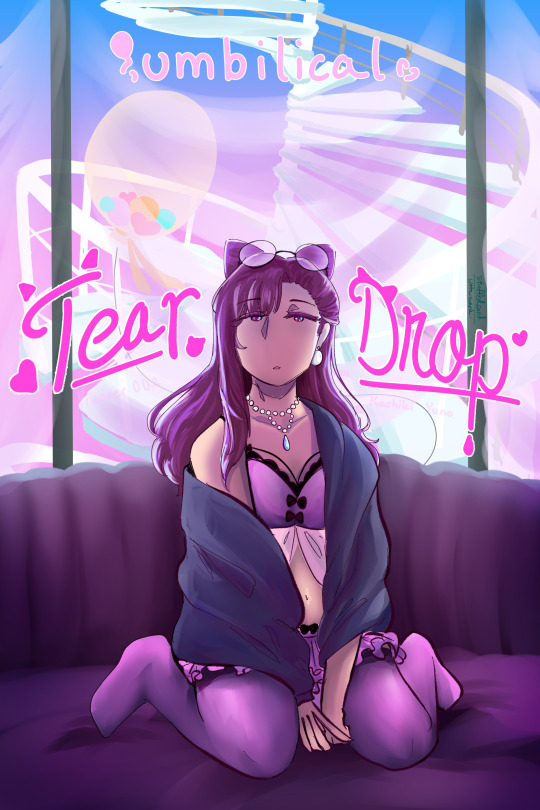
almost finished illustrations for Haruka and Yuno
200 notes
·
View notes
Text
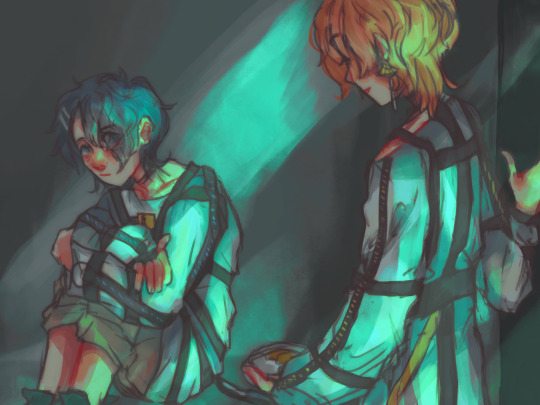
Are you alive?
380 notes
·
View notes
Text
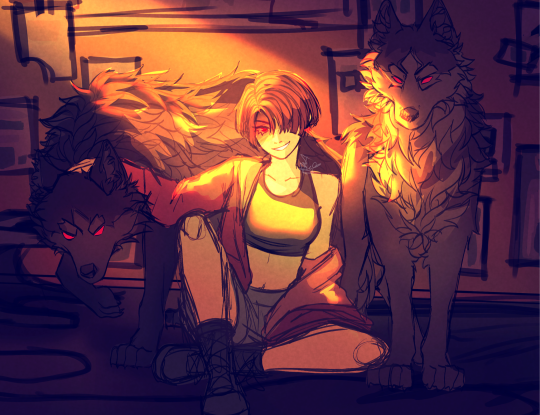
Kotoko wip🐺
Are there any Milgram fans here?
656 notes
·
View notes
Text
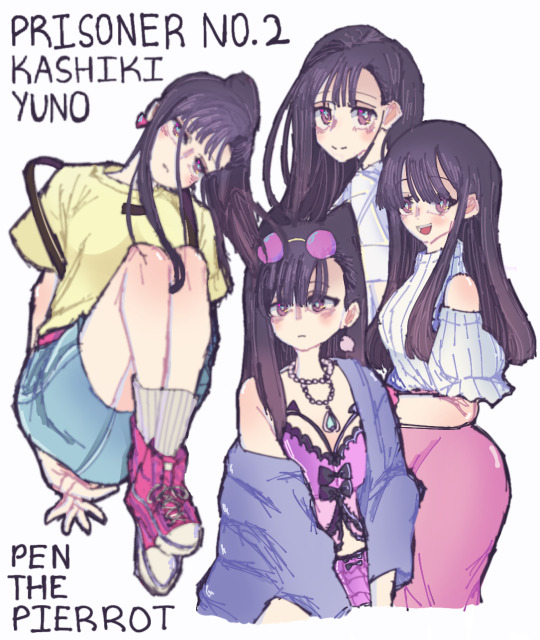
Haha artstyle keeps changing like my mood swings
245 notes
·
View notes
Text
Thinking about the similarities between Amane and Kotoko…thinking about how they had to go through a hellish childhood (very likely in Kotoko's case tbh based on her behavior) and grow up too quickly as a result...thinking about that one timeline conversation where Amane appreciates Kotoko for not treating her as less then just because she's a child and Kotoko brushing it off with her saying "at your age I was already the person I am today" and that she wouldn't let Amane off the hook just because she was a child...and yet Kotoko didn't attack Amane even though she was a guilty prisoner between T1 and T2....thinking about how Kotoko mainly targeted those who would hurt "the weak" (most specifically children and young girls) and how the last "Ko" in her name means "child"...thinking about how Kotoko probably sees a lot of her childhood self in Amane and how Kotoko is a reflection of what Amane could become if she continues to go through her suffering in the cult 😭😭😭

#adding on to this amane has consistently been the prisoner that challenges kotokos worldview the most because of how similar they are#i wonder if both of them potentially getting a guilty vote in this trial will effect this dynamic and maybe even bring them closer together#since kotoko will go from having to judge amane as someone to be punished or protected to someone with the same situation as her#it also may change amanes mind about nobody in milgram being like her? seeing someone else also being denied for carrying out their beliefs#ik im thinking too hopeful for milgram but for amane especially i think it could be good for her to find someone she can connect to#even if kotoko is definitely not the best role model she could provide amane with some validation considering we sure arent giving it to he#their parallels make me so upset!! like it just really shows the cycle of cruelty and how those hurt by it at a young age are often affecte#amane momose#kotoko yuzuriha
65 notes
·
View notes
Text

kotoko with lip piercing idk
155 notes
·
View notes
Text
I think a lot about this post about the implication of Amane's mother being mentally ill and possibly converted by her husband who was against her getting treatment, and I want to share some of my thoughts on that. Particularly about the way gender expectations are included in the story of Amane's family. Milgram already explores the topic of gender expectations much enough (Yuno, Mahiru, Fuuta, Kazui) so I think the situation of Amane's family would be an interesting addition to it.
Well, I'll speak for my country, but the situation with domestic violence and lone mothers (and poverty) in my country is very bad. There is a joke that the families here have either two problems, father left the family or father hasn't left the family. So the thought of Amane's father starting the cycle of violence in this family is very possible for me and I can imagine what happened.
It's complicated to try and break down all the existing gender expectations, but I want to note a few things in particular.
In a conservative society that pushes strict gender roles/expectations women are taught romance and men are not. Girls are supposed to be reading stories where a prince saves a princess from a tower and they live together forever while boys are supposed to play in dirt and leaves. Women enter marriages enamored, excited for a beautiful fairy-tale to come true. And for men it was never a fairy-tale; it's very much more likely for them to think it's a frustrating obligation where they're supposed to give away all of their money.
It's especially bad when these people are poor. Because men are expected to work and build careers and women are not (+ women are underpaid and often not given jobs at all because of misogyny). I mentioned it on this blog earlier in the context of Mahiru, but for example, I believe Mahiru wants marriage so much not only because of desire for affection, but because it would grant her independence in a "woman" way, contrasted to Mikoto who is trying to gain independence through overworking being the only man in the family. Mahiru is very much a princess locked in a tower. Of course she wouldn't know that it's even possible for her to work.
This often ends in a situation where the whole marriage depends on the wife (keeping up the house and the kids, taking emotional care of the whole family, trying to keep up the affectionate bond with the husband; some of them are also working full-time at the same time and there is a concept of "second shift" that talks about it) who is yet heavily financially dependent on the husband, and the husband doesn't want to be emotionally bothered with the family. Not to say that this kind of situation is not harmful for men because gender expectations are bad for literally everyone, but keeping the whole marriage on yourself while being afraid to be thrown out in the streets if your husband stops loving you is very draining for women. And it's definitely not an enamoring fairy-tale that they were reading about in the books.
I believe what could have happened is that Amane's mother got in love with Amane's father and followed into the cult with him because she wanted to stay with him forever. Since he's a lecturer, it's likely he's charismatic on his own and could have taught her that the cult grants an ideal world on top of that. We also know that she gave birth to Amane at quite an early age (Amane says that her mother was around Mahiru's age when she got born) so it's likely that her mother had a situation similar to Mahiru — trying to get married as soon as possible and become a perfect wife in a beautiful romance story.
However Amane's father turned out to be emotionally distant — he's always busy with his work after all. And also they're poor. And also they're in a cult that prohibits medical interference and entertainment and sets rules on food. I don't necessarily mean that this alone would make her develop a mental illness but this would very much make her mental state get worse.
The thought in the original post that she seems to inflict violence on Amane only when father is not home makes me think that she could lash out the frustration from her husband not loving her and well, kinda ruining her life, at the child — the result of this marriage. The symbol of this marriage.
Of course I'm not excusing her actions, and no one has to feel compassion for her situation or anything. It's just something that I've been thinking about in the context of Milgram's writing of gender expectations. And it's very likely for me that this cycle of violence started not from Amane's mother.
#MORE TALK ABOUT GENDER EXPECTATIONS IN MILGRAM LETS GO#its such an overlooked theme in the series despite having being present in basically the entire cast and their cases!!!#really interesting perspective here too with amanes mother it makes so much sense wow#amane momose#mahiru shiina
72 notes
·
View notes
Text








I'm the one who chose, let you and you and you all in
Happy or sad? Why decide?
30 notes
·
View notes
Text
if you made the cast of Milgram watch Revolutionary Girl Utena none of them would make it out of there alive
#this is the key to fixing all their problems /j#especially mahiru and muu tbh i think that show would change their lives#mahiru because it would free her from that patriarchal mindset and muu because she needs to know about shiori takatsuki
17 notes
·
View notes
Text
I think one of my favorite Fuuta moments is in Braze You when Es reads right fucking through him and spells out the very core of his character:
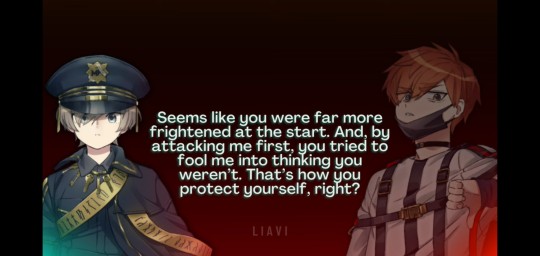
That's such a precise observation!! Any normal person would be annoyed/amazed/ashamed in response! You would expect the fiery type character to start yelling out denials and insisting Es isn't some psychologist or anything. But Fuuta. Fuuta my beloved. After someone points out that he jumps to violence as a coping mechanism, he proceeds to drop his voice real low and threatening, and say
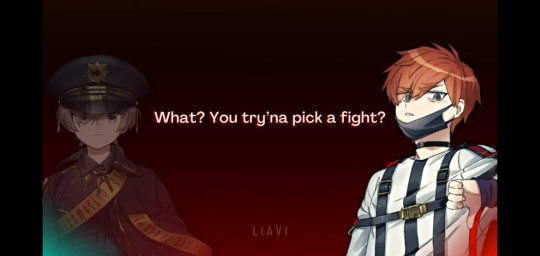
Just completely ignores every word they said and proves them right in a single instant...
And lol wait I was gonna leave this in the tags but genuinely this is a major reference point for characterizing him to me. of course the irony is hilarious and he says it so seriously it cracks me up. But also, this is exactly how simple and flawed his emotional reactions are. He really only has one go-to when he feels threatened, and it's to lash out with violence. The threat doesn't even have to be physical danger -- in this case the threat was just an emotional one. Es' comments made him feel exposed and brought to light something that he's ashamed of. Instead of processing these feelings and countering Es' point, he immediately attempts to prove his physical strength, which was never called into question. But to him physical strength/taking action is The Way to show courage and righteousness.
And this isn't just a selfish way of protecting himself -- this is how he protects others, too. He said he wanted to be everyone's representative after Es was violent with Yuno, so to avenge her he tried to take action. In his timeline with Kazui they talk about whether you should wait and observe a dangerous situation before jumping in, or charging in guns blazing without knowing the full situation. At first, Fuuta's response seems blatantly stupid, because of COURSE you shouldn't just charge into danger like that. But the way he describes it, he says, "Everyone's life is on the line. those who can fight should." He probably knows it's not the super intelligent method, but he still thinks its the only option to save those people! To him, action is the only way heroes save lives. Action is how justice gets done. Action is courage. And that's just so central to his character and explains a lot about all his behaviors in and out of Milgram...
153 notes
·
View notes
Text

If with one click, and I can reset everything, I want to be your favorite next
232 notes
·
View notes



